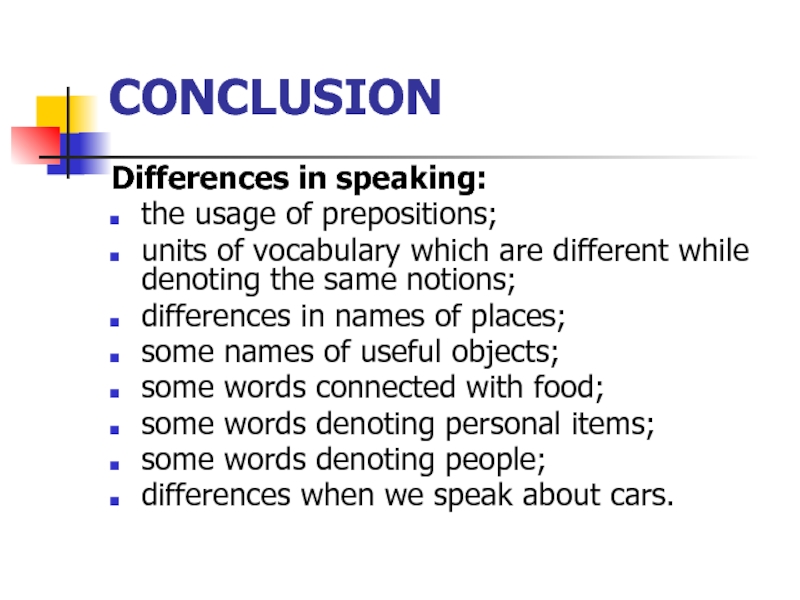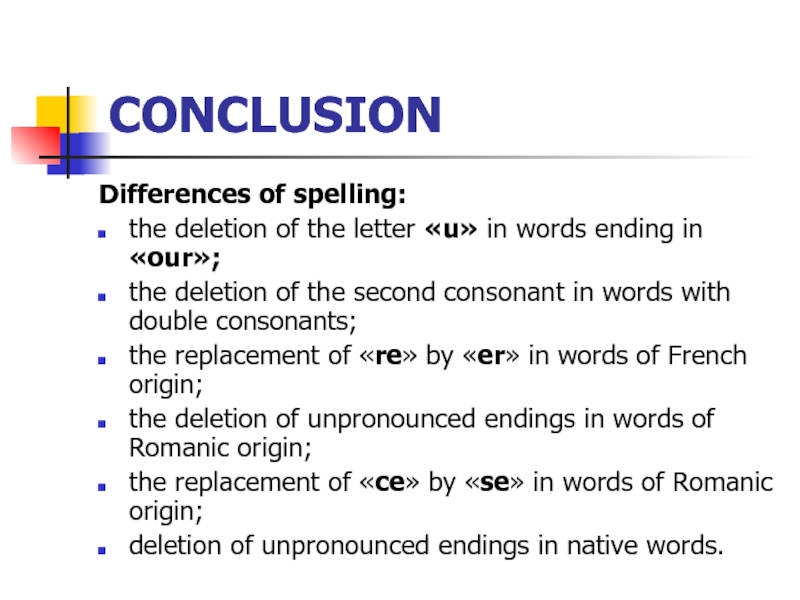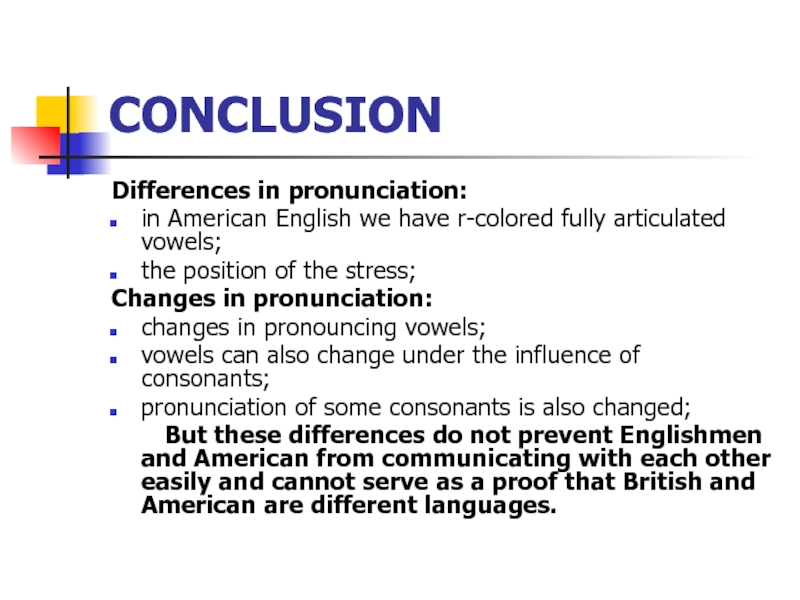Разделы презентаций
- Разное
- Английский язык
- Астрономия
- Алгебра
- Биология
- География
- Геометрия
- Детские презентации
- Информатика
- История
- Литература
- Математика
- Медицина
- Менеджмент
- Музыка
- МХК
- Немецкий язык
- ОБЖ
- Обществознание
- Окружающий мир
- Педагогика
- Русский язык
- Технология
- Физика
- Философия
- Химия
- Шаблоны, картинки для презентаций
- Экология
- Экономика
- Юриспруденция
Differences between the usage of British and American English
Содержание
- 1. Differences between the usage of British and American English
- 2. THE PURPOSE to consider differences in spelling, pronunciation, grammar and speaking between British and American English.
- 3. Two main variants of English:British EnglishAmerican English
- 4. Besides them there are:Canadian, Australian, Indian, New Zealand and other variants
- 5. DIFFERENCES IN SPEAKING There are some differences
- 6. DIFFERENCES IN SPEAKINGSome names of useful objects:
- 7. DIFFERENCES IN SPEAKINGSome words connected with food:
- 8. DIFFERENCES OF SPELLING the deletion of the
- 9. DIFFERENCES IN PRONUNCIATION There are some differences
- 10. CHANGES IN PRONUNCIATION There are the following
- 11. CHANGES IN PRONUNCIATIONThe pronunciation of some consonants
- 12. CONCLUSIONDifferences in speaking: the usage of prepositions;units
- 13. CONCLUSIONDifferences of spelling:the deletion of the letter
- 14. CONCLUSION Differences in pronunciation:in American English we
- 15. Скачать презентанцию
THE PURPOSE to consider differences in spelling, pronunciation, grammar and speaking between British and American English.
Слайды и текст этой презентации
Слайд 2THE PURPOSE
to consider differences in spelling, pronunciation, grammar and
speaking between British and American English.
Слайд 5DIFFERENCES IN SPEAKING
There are some differences in names of
places:
BE – AE; BE – AE:
Passage – hall;
cross-roads – intersection; pillar box - mail-box; the cinema - the movies;
studio - bed-sitter; one-room – apartment;
pavement – sidewalk; tube – underground, subway;
surgery - doctor’s office; lift – elevator;
Слайд 6DIFFERENCES IN SPEAKING
Some names of useful objects:
BE – AE;
BE – AE:
biro – ballpoint; rubber – eraser;
parcel
– package; carrier bag - shopping bag;reel of cotton - spool of thread
Слайд 7DIFFERENCES IN SPEAKING
Some words connected with food:
BE –AE; BE
– AE:
tin – can; sweets – candies;
chips -
french fries; minced meat - ground beef.
If we speak about cars there are also some differences:
BE –AE; BE – AE:
Boot – trunk; bumpers – fenders;
a car - an auto; to hire a car - to rent a car.
Слайд 8DIFFERENCES OF SPELLING
the deletion of the letter «u» in
words ending in «our», e.g. honor, favor;
the deletion
of the second consonant in words with double consonants, e.g. traveler, wagon;the replacement of «re» by «er» in words of French origin, e.g. theater, center;
the deletion of unpronounced endings in words of Romanic origin, e.g. catalog, program;
the replacement of «ce» by «se» in words of Romanic origin, e.g. defense, offense;
deletion of unpronounced endings in native words, e.g. tho, thro.
Слайд 9DIFFERENCES IN PRONUNCIATION
There are some differences in the position
of the stress:
BE – AE; BE – AE:
add`ress
– `address, la`boratory -`laboratory; re`cess -`recess, re`search - `research;
in`quiry - `inquiry, ex`cess - `excess.
Some words in BE and AE have different pronunciation:
BE – AE; BE – AE:
[`fju:tail] – [`fju:tl], [`dousail] - [dosl];
[`fig] – [figyer]; [shedju:l] – [skedju:l].
Слайд 10CHANGES IN PRONUNCIATION
There are the following changes in pronouncing
vowels:
shortening of long vowels, especially at the end
of the word and before voiceless consonants, e.g. see, keep; lengthening of short vowels before voiced consonants, e.g. big, good, come, jam etc.
In the words consisting of three or more syllables there is a tendency to have two main stresses, e.g. [`nes `seri], [`int`restiη].
The diphthong [ou] is pronounced [u], e.g. home – [hum], go – [gu].
The diphthong [uə] is pronounced [o:], e.g. sure [∫o:].
Vowels can also change under the influence of consonants:
After fricatives and consonants [n] and [m], [ju:] is pronounced as [u:], e.g. resume, music, news, enthusiasm.
Before fricatives and combinations of fricatives with consonants [a:] is pronounced as [æ], e.g. dance, answer, class, fast.
Слайд 11CHANGES IN PRONUNCIATION
The pronunciation of some consonants is also changed:
After a vowel [r] is pronounced, e.g. [ka:r], [ha:rt].
There appears an intrusive [r] in the combinations where after the final vowel [ə] there is a vowel at the beginning of the next word, e.g. the idea of, Asia and Europe (on the analogy with word combinations there is, there are).
[s] is used instead of [∫] before [i] in the structure of suffixes, e.g. social [‘sousil], negotiate [ni`gousi,eit];
Combinations of sounds [dj], [tj], [sj] in such words as duke, tube, issue have two variants of pronunciation: [d3u:k] and [dju:k], [t∫u:b] and [tju:b], [`i∫u:] and [`isju:];
Pronunciation approaching spelling is being developed, e.g. often [`oftn], forehead [fo:`hed] etc;
[t] and [d] at the end of words are not pronounced, e.g. «half past five’ [`ha:f `pa:s`faiv], «old man» [`oul `mæn].
Слайд 12CONCLUSION
Differences in speaking:
the usage of prepositions;
units of vocabulary which
are different while denoting the same notions;
differences in names of
places;some names of useful objects;
some words connected with food;
some words denoting personal items;
some words denoting people;
differences when we speak about cars.
Слайд 13CONCLUSION
Differences of spelling:
the deletion of the letter «u» in words
ending in «our»;
the deletion of the second consonant in
words with double consonants;the replacement of «re» by «er» in words of French origin;
the deletion of unpronounced endings in words of Romanic origin;
the replacement of «ce» by «se» in words of Romanic origin;
deletion of unpronounced endings in native words.
Слайд 14CONCLUSION
Differences in pronunciation:
in American English we have r-colored fully
articulated vowels;
the position of the stress;
Changes in pronunciation:
changes in pronouncing
vowels;vowels can also change under the influence of consonants;
pronunciation of some consonants is also changed;
But these differences do not prevent Englishmen and American from communicating with each other easily and cannot serve as a proof that British and American are different languages.
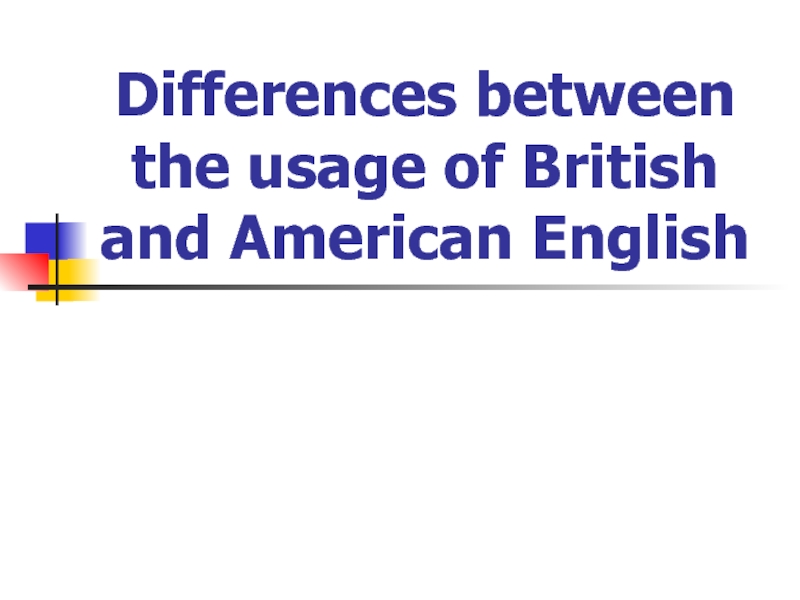
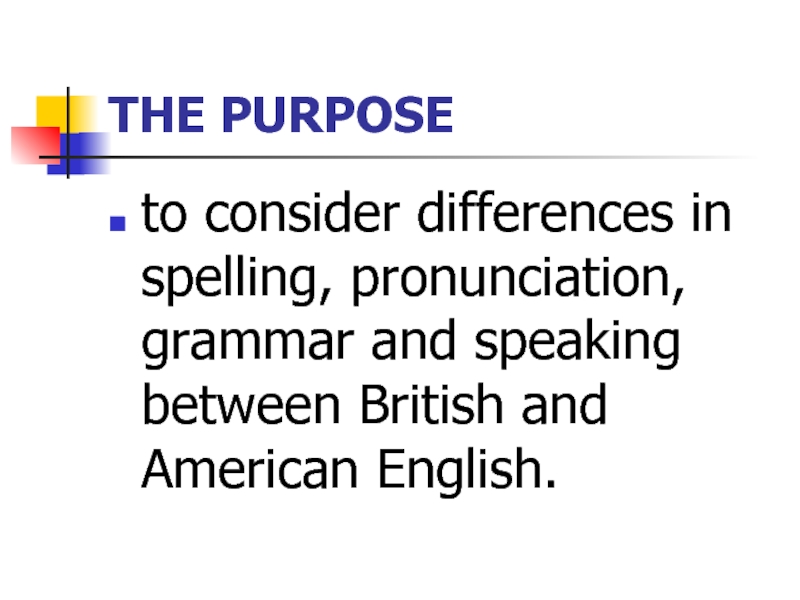


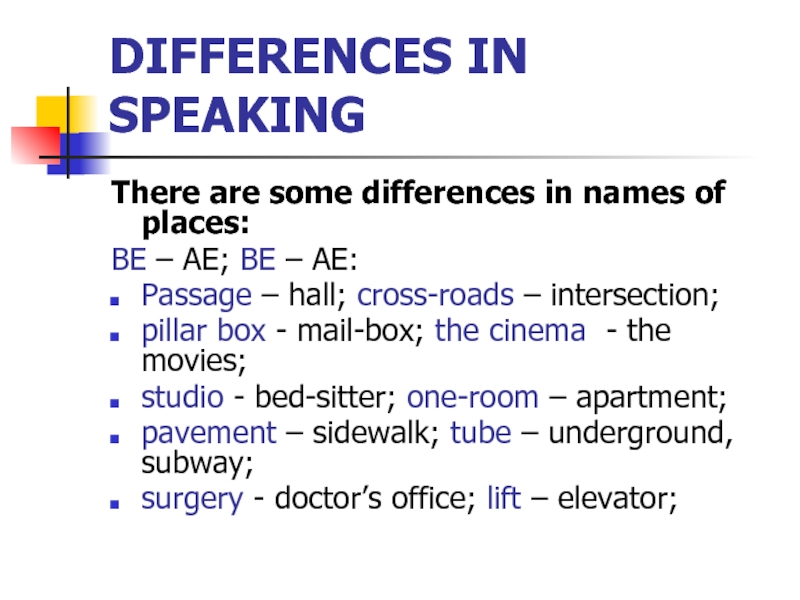
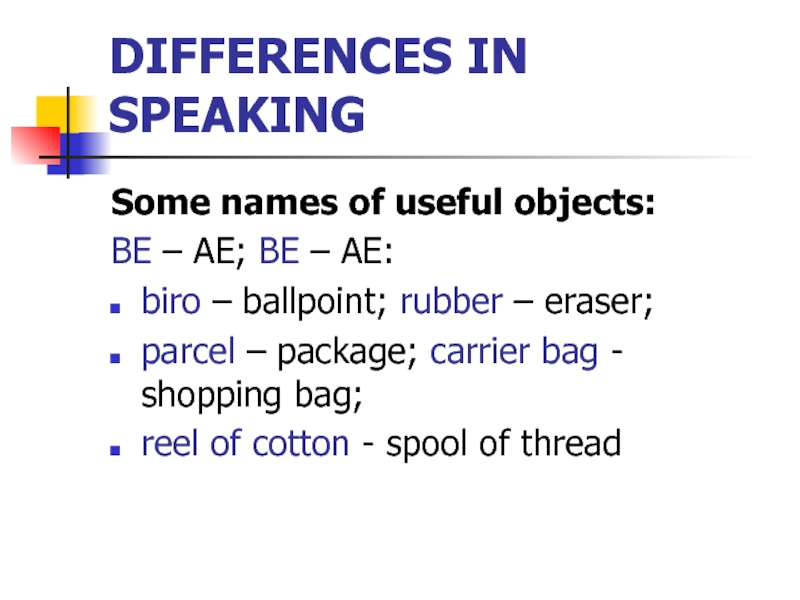
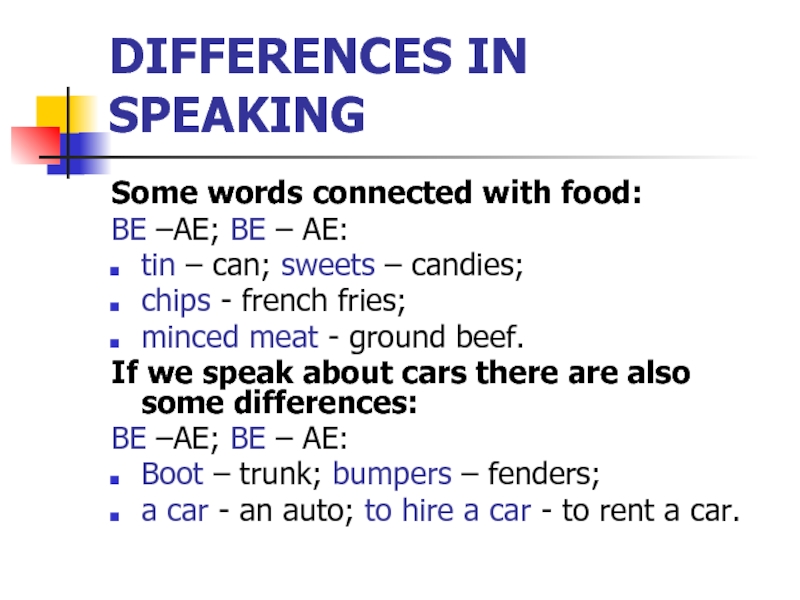
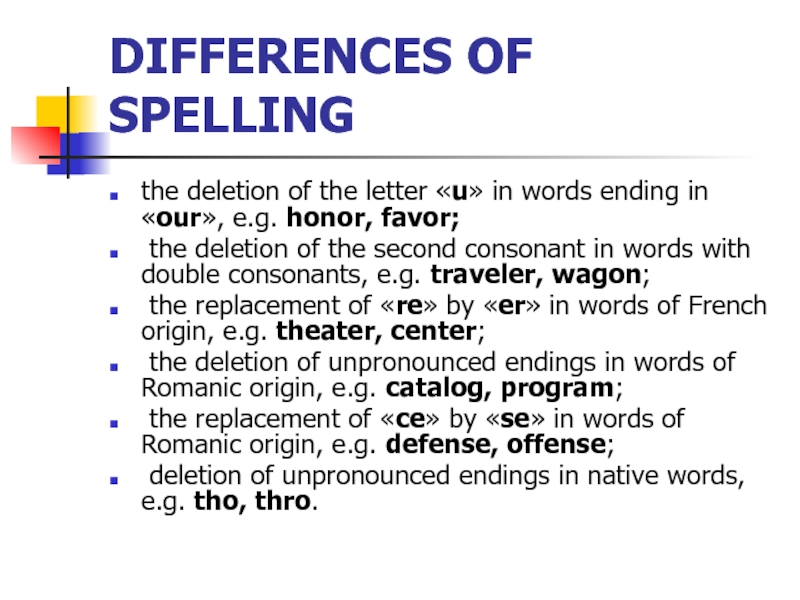
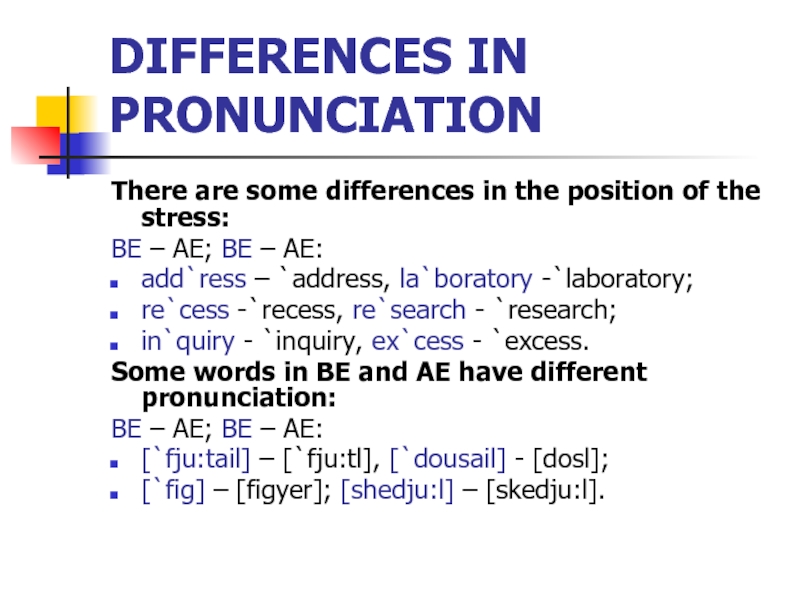
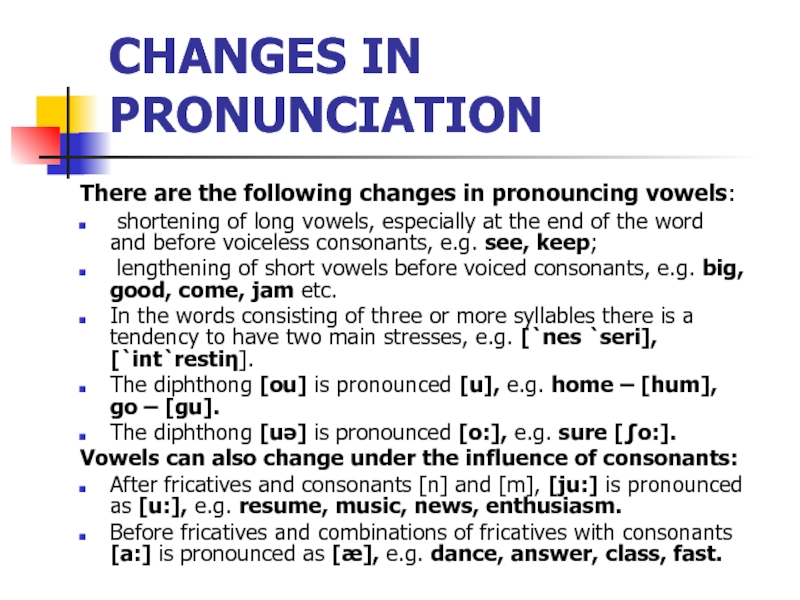
![Differences between the usage of British and American English CHANGES IN PRONUNCIATIONThe pronunciation of some consonants is also changed: After CHANGES IN PRONUNCIATIONThe pronunciation of some consonants is also changed: After a vowel [r] is pronounced, e.g.](/img/thumbs/134ff56bbf1430946f94272c81f00514-800x.jpg)
